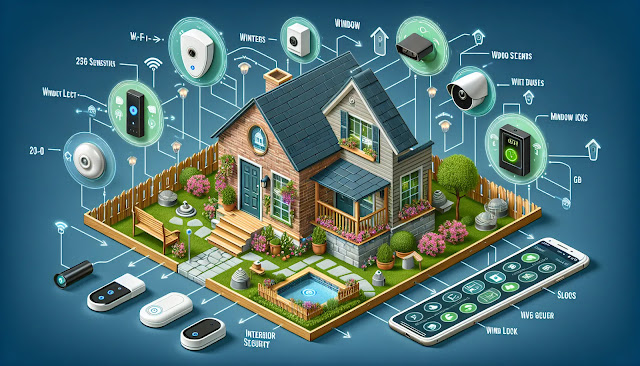Understanding the Benefits of Smart Home Automation for Beginners
Home automation advantages
Smart home automation has become increasingly popular in recent years, offering homeowners a wide range of benefits and conveniences. From enhanced security and energy efficiency to increased comfort and convenience, smart home technology has the potential to revolutionize the way we live. In this article, we will explore the various advantages of smart home automation, making it easier for beginners to understand the potential benefits of integrating smart technology into their homes.
Benefits of smart home technology
Smart home technology offers a myriad of benefits that can greatly enhance the quality of life for homeowners. Here are some key advantages:
1. Increased security
One of the biggest advantages of smart home automation is improved security. With smart security systems, homeowners can remotely monitor their property through cameras and sensors, receive real-time alerts in case of any unusual activity, and even control access to their home through smart locks. This level of control and monitoring provides homeowners with peace of mind and a heightened sense of security.
2. Energy efficiency
Smart home automation allows homeowners to have better control over their energy usage, resulting in increased energy efficiency. Smart thermostats, for example, can learn the occupants' patterns and adjust the temperature accordingly, optimizing energy consumption and reducing utility bills. Additionally, smart lighting systems enable users to remotely control and schedule the operation of lights, minimizing unnecessary energy consumption.
3. Convenience and comfort
One of the most appealing aspects of smart home automation is the convenience and comfort it offers. With smart technology, homeowners can automate routine tasks such as turning on/off lights, adjusting the thermostat, or even brewing a cup of coffee, all from the comfort of their smartphones or voice-controlled devices. This level of automation saves time and adds convenience to daily routines, making life easier and more enjoyable.
4. Improved accessibility
Smart home technology also caters to individuals with disabilities or limited mobility, offering them increased accessibility. Voice-controlled assistants and smart devices allow users to control various aspects of their homes without the need for physical interaction, making it easier for individuals with mobility impairments to navigate their living spaces. From opening doors to adjusting lighting, these technologies empower individuals to live more independently.
5. Cost savings
While the initial investment in smart home automation may seem substantial, the long-term cost savings make it a worthwhile investment. With the ability to monitor and control energy usage, homeowners can significantly reduce their utility bills. Additionally, smart home automation can help prevent costly damages by providing real-time alerts for issues such as leaks or smoke detection, allowing homeowners to address these problems before they escalate and become more expensive to fix.
6. Increased property value
Integrating smart home technology into a property can also significantly increase its value. Buyers are increasingly looking for homes with smart features, as they recognize the added convenience, security, and energy efficiency they provide. By investing in smart home automation, homeowners can not only enjoy the benefits themselves but also potentially attract more buyers and command a higher sale price when the time comes to sell their property.
Introduction to smart home automation
For beginners who are new to the concept of smart home automation, it is essential to understand the basics. Smart home automation refers to the integration of technology into various aspects of a home, allowing homeowners to control and automate various functions remotely or through voice commands.
The backbone of smart home automation is a central hub or controller that connects and communicates with different smart devices and appliances. This hub acts as the "brain" of the system, enabling users to monitor and control their devices through a smartphone app or voice-controlled assistant.
Smart devices such as thermostats, lighting systems, security cameras, door locks, and entertainment systems can be integrated into the home automation system. These devices communicate with the central hub, allowing homeowners to control and manage them seamlessly.
Smart home automation offers a user-friendly interface, making it accessible to beginners and technologically inexperienced homeowners. The setup usually involves connecting the hub to the home's Wi-Fi network and pairing it with the desired smart devices. Once the setup is complete, users can configure their preferences and control their devices through a smartphone app or voice commands.
In conclusion, smart home automation provides numerous advantages for homeowners, including increased security, energy efficiency, convenience, accessibility, cost savings, and increased property value. By understanding the benefits and basics of smart home technology, beginners can make informed decisions about integrating smart devices and systems into their homes, enhancing their lifestyle and adding value to their properties.






